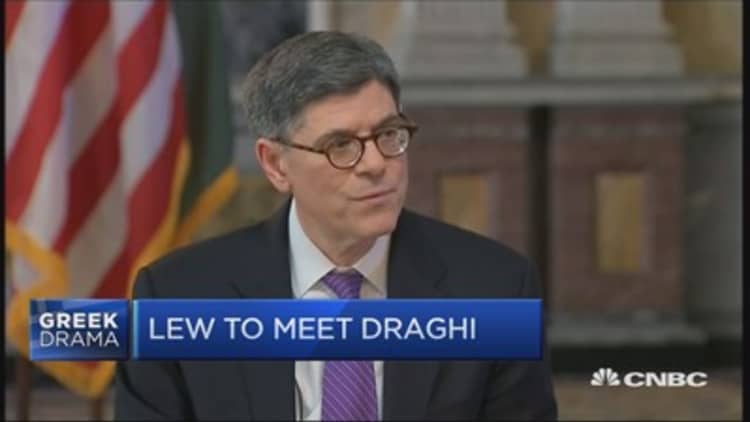
As U.S. Treasury Secretary Jack Lew jets into Europe to urge policymakers to keep the Greek rescue on track, there are fears that the International Monetary Fund has derailed country's third bailout.
Lew is expected to visit Frankfurt, Berlin and Paris over the next two days for talks on Greece with senior financial officials, including the President of the European Central Bank Mario Draghi and finance ministers of France and Germany.
His trip comes at a crucial moment in the Greek crisis, with the country's parliament due to vote later Wednesday on wide-reaching reforms and spending cuts.
Read MoreCrunch time in Greece as Tsipras eyes crucial vote
Meanwhile, the International Monetary Fund (IMF) stirred already tense relations between Greece and its creditors, which had just agreed to open talks on a 86 billion euros bailout, by saying on Tuesday that Greek debt relief was essential.
The IMF study, first reported by Reuters, showed that while Greece has to stick to the reform program, it still needed far more debt relief than European governments were willing to consider.
The IMF study was used as part of the weekend's negotiations with the Eurogroup of euro zone finance ministers and leaders.
According to the news agency, European countries would have to give Greece a 30-year grace period on servicing all its European debt, including new loans, and a dramatic maturity extension. Otherwise, Europe had to accept "deep upfront haircuts" on existing loans.
It's not the first time the IMF has called for debt relief over Greece, somewhat ironically, given that Greece missed a 1.6 billion euro loan repayment to the Fund last month and another 456 million euros due earlier this week.
Defections and deal-breakers
Eyebrows have been raised over the timing of the study's release, coming a day before the deadline imposed on the Greek parliament to pass legislation on reforms. Analysts said the IMF's advocacy of debt relief could now be a deal-breaker.
Moreover, the IMF has already reportedly signaled it could walk away from putting 16.4 billion euros of its own funds into a third bailout without some kind of debt relief, according to an IMF memo sent to European leaders last weekend and reported by the Financial Times on Wednesday.
"It's very interesting that the IMF has weighed in ahead of this vote," Adam Myers, European Head of FX Research, told CNBC Wednesday.
"When one of the creditors that is on the hook for 25 percent of the total bailout, says there needs to be an extension (of maturities) of that magnitude, it tells you that the plan that was agreed is unworkable.
Myers believed that some kind of "creditor acceptance of debt relief some time down the road in the next couple of weeks, "because without it, we'll be doing this again in a few months' time."
Ahead of Jack Lew's meeting with German Finance Minister Wolfgang Schaeuble, a well-known critic of Greece, one analyst said the deal could yet unravel with Greece without debt relief.
"If Germany wants the IMF on board it looks like it will have to give a lot more ground on debt relief or risk the agreement with Greece falling apart," Jasper Lawler, market analyst at CMC Markets said in a note Wednesday.
Lew's visit to Europe comes amid a fractious political environment in Greece ahead of the vote on reforms and nervousness in Europe over how the Greek parliament will vote.
Legislation on widespread reforms and spending cuts must be passed by the Greek parliament Wednesday for Greece to secure the third bailout. Predictably, hardliners in Tsipras' Syriza party are opposing more cuts and are expected to defect, meaning that a cabinet reshuffle is also likely in the next few days.
Read MoreGreek austerity vote: What to look out for
In a television interview on Tuesday, Greek Prime Minister Alexis Tsipras defended the 86 billion euro ($95.2 billion) bailout deal on Tuesday, saying the deal he struck with lenders at the weekend was necessary to avoid exiting the euro and that he had no alternative.
He also said, however, that he did not "believe in the deal," a comment likely to worry European creditors that are already distrustful of Greece's conviction to stick to a new bailout agreement.
- By CNBC's Holly Ellyatt, follow her on Twitter @HollyEllyatt. Follow us on Twitter: @CNBCWorld


